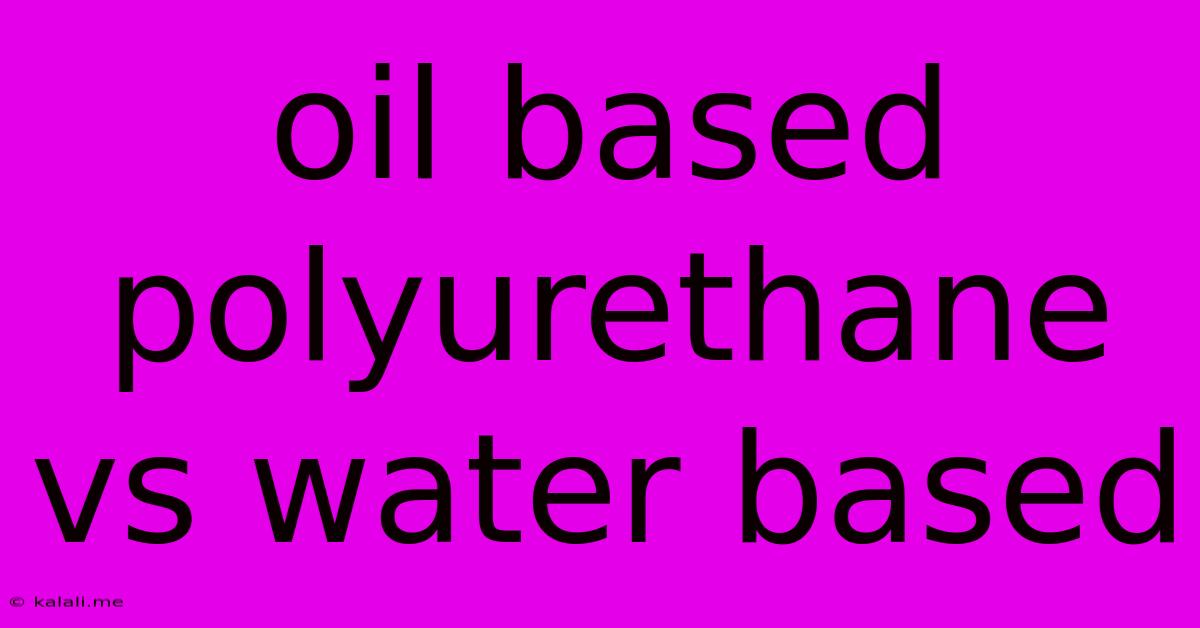Oil Based Polyurethane Vs Water Based
Kalali
May 31, 2025 · 4 min read

Table of Contents
Oil-Based vs. Water-Based Polyurethane: Which Finish is Right for Your Project?
Choosing between oil-based and water-based polyurethane can feel overwhelming. Both offer durable protection for wood, but they differ significantly in application, cleanup, and final appearance. This guide breaks down the key distinctions to help you select the best polyurethane for your next project, whether it's refinishing antique furniture or protecting a new deck. Understanding their pros and cons will ensure a successful finish every time.
Key Differences: A Quick Overview
Before diving into the specifics, here's a concise comparison:
| Feature | Oil-Based Polyurethane | Water-Based Polyurethane |
|---|---|---|
| Drying Time | Much slower (24+ hours between coats) | Faster (2-4 hours between coats) |
| Cleanup | Requires mineral spirits or paint thinner | Easy cleanup with soap and water |
| Durability | Generally more durable, especially yellowing resistant | Increasingly durable, but may require more coats for equivalent protection |
| VOCs | Higher VOC content (volatile organic compounds) | Lower VOC content, more environmentally friendly |
| Appearance | Amber tint, can enhance wood’s natural color | Clearer finish, less likely to yellow over time |
| Cost | Often slightly more expensive | Often slightly less expensive |
Oil-Based Polyurethane: The Traditional Choice
Oil-based polyurethane has been a staple in woodworking for decades. Its reputation is built on its exceptional durability and rich, amber tone.
Advantages of Oil-Based Polyurethane:
- Superior Durability: Oil-based polyurethane provides a harder, more scratch-resistant finish than water-based alternatives, making it ideal for high-traffic areas or furniture that will see heavy use. It offers excellent protection against wear and tear.
- Enhanced Wood Grain: The amber tint subtly enhances the natural color and grain of the wood, giving it a warmer, richer look. This makes it a popular choice for projects where showcasing the wood's beauty is paramount.
- Better for Exterior Applications (Generally): Though specific product labels should always be checked, oil-based polyurethanes generally offer better UV resistance and water repellency, making them suitable for outdoor furniture and decks.
Disadvantages of Oil-Based Polyurethane:
- Slow Drying Time: This significantly extends project completion time, requiring longer waits between coats.
- Difficult Cleanup: Requires solvents like mineral spirits or paint thinner, posing disposal and safety challenges.
- Strong Odor: The fumes are potent and require good ventilation during application and drying.
- Yellowing: Over time, exposure to UV light can cause yellowing, altering the finished look.
Water-Based Polyurethane: The Modern Alternative
Water-based polyurethane is a newer option that's gained popularity due to its ease of use and environmental friendliness.
Advantages of Water-Based Polyurethane:
- Fast Drying Time: Dries much faster than oil-based, allowing for quicker project completion.
- Easy Cleanup: Simply cleans up with soap and water, eliminating the need for harsh solvents.
- Low VOC Content: More environmentally friendly with fewer harmful emissions.
- Clear Finish: Provides a clearer, less yellowed finish over time, preserving the natural wood color.
Disadvantages of Water-Based Polyurethane:
- Less Durable (Traditionally): While modern formulations are improving, it may not be as durable as oil-based for high-impact applications. More coats may be needed to reach the same level of protection.
- Can Raise the Grain: Water can sometimes raise the wood grain, requiring additional sanding before applying subsequent coats.
- Less Suitable for Exterior Use (Generally): While exterior-grade water-based polyurethanes are available, they may not offer the same level of UV and water protection as oil-based options.
Choosing the Right Polyurethane:
The best choice depends entirely on your project's needs and your priorities. Consider these factors:
- Project Location: Interior projects often benefit from water-based polyurethane's ease of use, while exterior projects might require the extra durability of oil-based.
- Level of Durability Required: For high-traffic areas or heavily used items, oil-based might be preferable.
- Environmental Concerns: Water-based is the more eco-friendly option.
- Personal Preferences: Consider the drying time, cleanup process, and desired final appearance.
With this information, you're well-equipped to make an informed decision and achieve a beautiful, long-lasting finish on your next woodworking project. Remember to always read and follow the manufacturer's instructions for best results.
Latest Posts
Latest Posts
-
Drilled And Slotted Rotors Vs Regular
Jun 01, 2025
-
Drain From Washing Machine Backs Up
Jun 01, 2025
-
E212 Cant Open File For Writing
Jun 01, 2025
-
How Long Was Noah Building The Ark
Jun 01, 2025
-
Did The Solar Eclipse Alter Hurricanes
Jun 01, 2025
Related Post
Thank you for visiting our website which covers about Oil Based Polyurethane Vs Water Based . We hope the information provided has been useful to you. Feel free to contact us if you have any questions or need further assistance. See you next time and don't miss to bookmark.